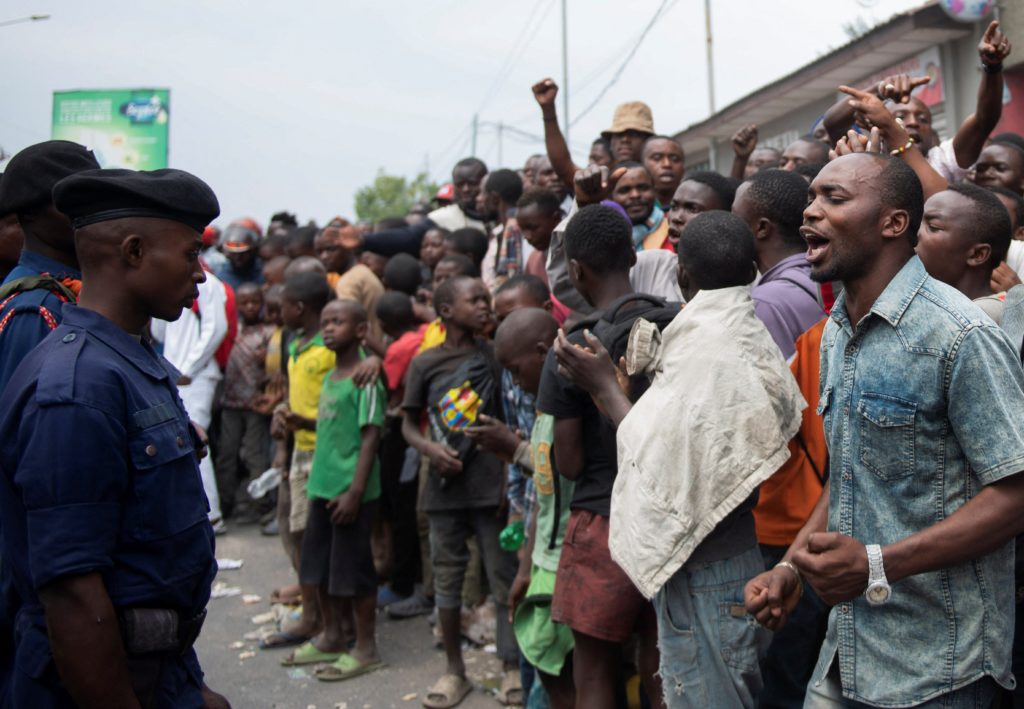The secretary-general of the Congolese bishops' conference offered his church's help in rebuilding dialogue after dozens died in protests about the ineffectiveness of U.N. peacekeepers.
"The international community seems quite ignorant about the scale of inhumanity here -- why is it so silent and inactive?" said Msgr. Donatien Nshole Babula.
"It doesn't seem to understand that (Congo's) sovereignty has been denied and under attack for years, and that we can never escape this turbulence as long as armed groups deliberately seek to destabilize our country."
"The Congolese people feel totally abandoned -- both by those in power and by those who came here with a mission to defend them. I can understand the loss of popular confidence that's fueled this confrontation."
The Kinshasa-based priest made the comments in the wake of violent demonstrations against members of the U.N.-backed multilateral stabilization mission in Congo, known by the acronym MONUSCO.
In an Aug. 4 interview with Catholic News Service, Msgr. Nshole said peace appeals by Congo's Catholic bishops had helped calm the situation, adding that church demands for an inquiry into the violence were being followed up.
"The protests, provoked by MONUSCO, have subsided in their levels of violence -- it seems the church's voice has been heard," Msgr. Nshole told CNS.
"MONUSCO is now in dialogue with the government and civil society organizations, discussing proposed solutions. These are all things which we called for."
At least 36 people were killed and 170 injured in a series of late-July assaults on MONUSCO bases in the eastern Ituri and Kivu provinces. Protesters were angered by the U.N. mission's failure to provide protection against armed groups.
Troops from the 14,000-strong mission, deployed since 1999, opened fire on civilians at a frontier post at Kasindi, while four U.N. peacekeepers were killed during a riot at Butembo.
In mid-July, MONUSCO spokesman Matthias Gillmann told Radio France International 400 MONUSCO troops had died during the 23-year mission alongside Congolese government forces. He said one of the main rebel groups, M23, now "boasted firepower and equipment" including machine guns, long-range mortar and anti-aircraft weapons that outmatched U.N. military capabilities.
On Aug. 4, Congo requested Gillmann be removed from the country, RFI reported.
In a July 27 interview with his diocese's Catholic Radio Moto, Bishop Melchisedec Sikuli Paluku of Butembo-Beni urged fresh negotiations between the U.N. and the Congolese government, adding that he feared his "whole city" would otherwise rebel.
Meanwhile, the bishops' conference demanded immediate investigations into the causes of violence and appealed to politicians and community leaders "to refrain from speeches likely to inflame further hatred."
"We believe the government and MONUSCO have shown the limits of their mission to provide security for populations exposed to armed attacks," said the July 27 statement, signed by the conference president, Archbishop Marcel Utembi Tapa of Kisangani.
"But resorting to violence or looting can only amplify and perpetuate evil, as well as public suffering."
Patrick Muyaya Katembwe, government spokesman, told the media Aug. 2 that public confidence in U.N. peacekeepers was now "broken," adding that the government would insist on MONUSCO's withdrawal from the country.
Msgr. Nshole said he believed the U.N. Mission was still needed in eastern Congo, but added that the church was ready "to facilitate dialogue to re-evaluate its role" in light of the government's demand.
"The whole population has been left disillusioned, alone and uniquely vulnerable," he told CNS.
"What's desperately needed now are bold steps to rebuild confidence against the endless aggression of armed groups. This remains the church's essential message."
The Catholic Church, making up two-thirds of Congo's 67.5 million inhabitants, has long been involved in peace efforts across the African country, where around 5 million people have been displaced by fighting, according to U.N. data.

